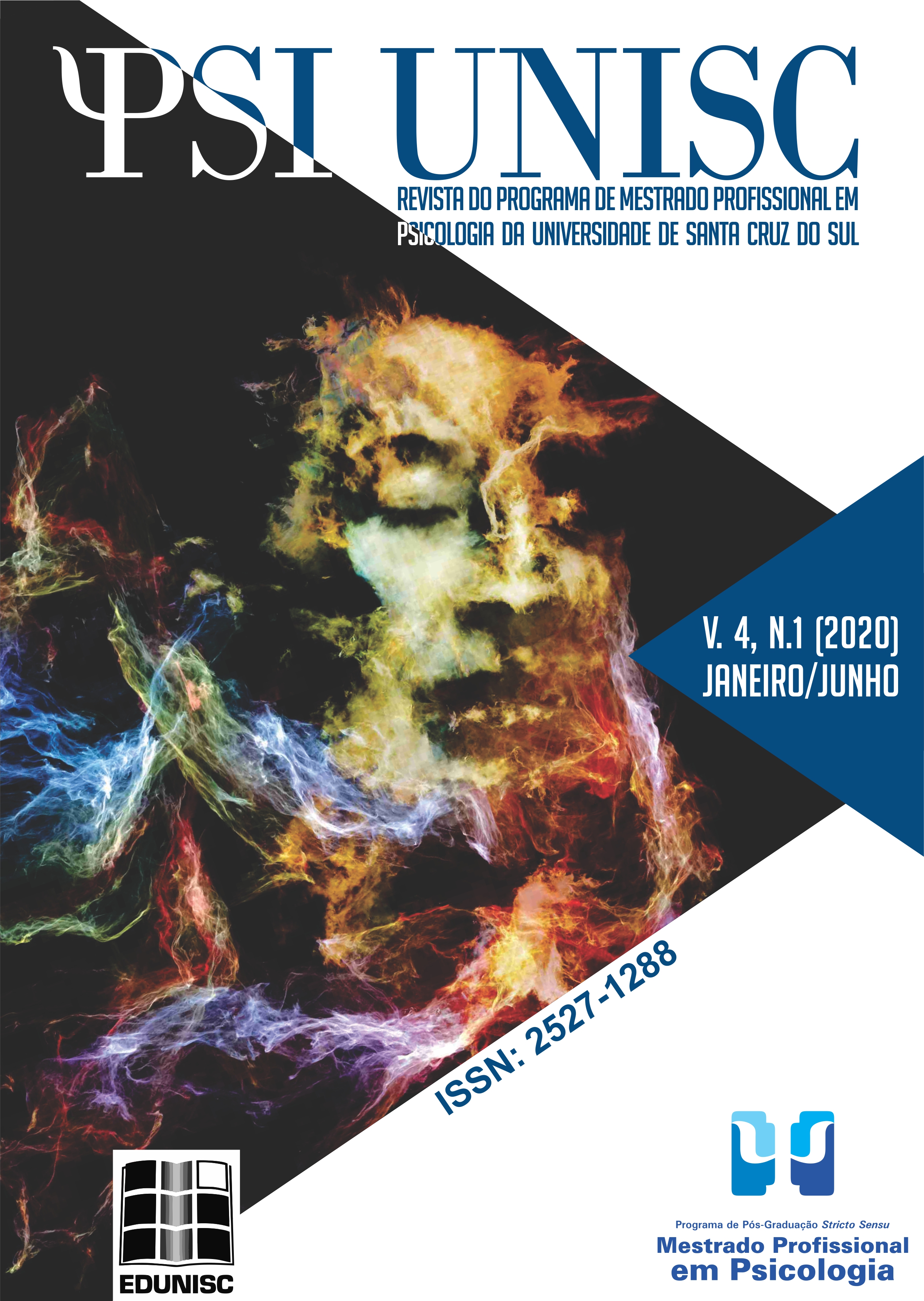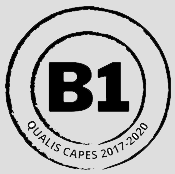A Report of Psychosocial Care to the Family of the Accused of Sexual Abuse
DOI:
https://doi.org/10.17058/psiunisc.v4i1.14034Keywords:
Sexual abuse, Family, Psychosocial care, Experience report.Abstract
The experience of sexual abuse accusations reverberates in the lives of the victims and the family, causing, for example, social withdrawal and embarrassment. However, little attention is given to the accused’s family. Considering that, this article aimed at reporting an experience part of the internship project “Support and Strengthening of Family Bonds”, in which psychosocial care was provided to Mrs. A (37 years old), wife of an accused of sexual abuse. A total of 25 individual meeting weekly were conducted lasting approximately 60 minutes each. Initially, issues related to the accusation were addressed; however, other topics emerged throughout the meetings. Hence, the meetings were divided into the following thematic blocks: (a) rapport and demand understanding; (b) interpersonal issues after the accusation; (c) strengthening of bonds; (d) personal beliefs and identity; and (e) personal empowerment. The issues raised by the client were similar to those found in the literature regarding victims of sexual abuse family members, including feelings of social isolation and embarrassment. The accusation of child sexual abuse against the husband had a profound impact on several spheres of the client’s life. We conclude that qualified listening and psychosocial care are essential. We underscore the importance of systemically understanding the contexts and relationships in which not only the victims and the accused of violence are inserted but also their families. We call attention to the importance of social support and the strengthening of family ties in the process of coping with the abuse accusation, as well as the importance of professional support.The experience of sexual abuse accusations reverberates in the lives of the victims and the family, causing, for example, social withdrawal and embarrassment. However, little attention is given to the accused’s family. Considering that, this article aimed at reporting an experience part of the internship project “Support and Strengthening of Family Bonds”, in which psychosocial care was provided to Mrs. A (37 years old), wife of an accused of sexual abuse. A total of 25 individual meeting weekly were conducted lasting approximately 60 minutes each. Initially, issues related to the accusation were addressed; however, other topics emerged throughout the meetings. Hence, the meetings were divided into the following thematic blocks: (a) rapport and demand understanding; (b) interpersonal issues after the accusation; (c) strengthening of bonds; (d) personal beliefs and identity; and (e) personal empowerment. The issues raised by the client were similar to those found in the literature regarding victims of sexual abuse family members, including feelings of social isolation and embarrassment. The accusation of child sexual abuse against the husband had a profound impact on several spheres of the client’s life. We conclude that qualified listening and psychosocial care are essential. We underscore the importance of systemically understanding the contexts and relationships in which not only the victims and the accused of violence are inserted but also their families. We call attention to the importance of social support and the strengthening of family ties in the process of coping with the abuse accusation, as well as the importance of professional support.Downloads
References
Araújo, M. F. (2002). Violência e abuso sexual na família. Psicologia em Estudo, 7(2), 3-11. doi: 10.1590/S1413-73722002000200002
Beck, J. (2014). Terapia cognitivo-comportamental: Teoria e prática (2ª ed., S. M. da Rosa, Trad). Porto Alegre: Artmed.
Brito, C. O., Nascimento, C. R. R., & Rosa, E. M. (2018). Conselho tutelar: rede de apoio socioafetiva para famílias em situação de risco?. Pensando familias, 22(1), 179-192. Recuperado de http://pepsic.bvsalud.org/scielo.php?script=sci_arttext&pid=S1679-494X2018000100014&lng=pt&tlng=pt
Brito, R. C., & Koller, S. H. (1999). Desenvolvimento humano e redes de apoio social e afetivo. In A. M. Carvalho (Org.), O mundo social da criança: Natureza e cultura em ação. (pp. 115-130). São Paulo: Casa do Psicólogo.
Campos, M., Schor, N., Anjos, R., Laurentiz, J., Santos, D., & Peres, F. (2005). Violência Sexual: integração saúde e segurança pública no atendimento imediato à vítima. Saúde e Sociedade, 14(1), 101-109. doi: 10.1590/S0104-12902005000100011
Corcoran, J., & Pillai, V. (2008). A meta-analysis of parent involved treatment for child sexual abuse. Research on Social Work Practice, 18(5), 453-464. doi: 10.1177%2F1049731507313980
Costa, L. F., Penso, M. A., Rufini, B. R., Mendes, J. A. A., & Borba, N. F. (2007). Família e abuso sexual: silêncio e sofrimento entre a denúncia e a intervenção terapêutica. Arquivos Brasileiros de Psicologia, 59(2), 245-255. Recuperado de http://pepsic.bvsalud.org/scielo.php?script=sci_arttext&pid=S1809-52672007000200013&lng=pt&tlng=pt
Costa, L., Rocha, C., & Cavalcante, L. (2018). Características biopsicossociais entre acusados de agressão sexual contra crianças/adolescentes em contextos intra e extrafamiliar. Temas em Psicologia, 26(1), 283-295. doi: http://dx.doi.org/10.9788/tp2018.1-11pt
Cunha, G. G., & Dutra, E. M. S. (2019). Um olhar fenomenológico para mães de crianças vítimas de abuso sexual: uma revisão de literatura. Revista da Abordagem Gestáltica, 25(1), 103-110. doi: 10.18065/RAG.2019v25.10
De Antoni, C., Yunes, M., Habigzang, L., & Koller, S. (2011). Abuso sexual extrafamiliar: percepções das mães de vítimas. Estudos de Psicologia (Campinas), 28(1), 97-106. doi: 10.1590/S0103-166X2011000100010
Dell’Aglio, D., Moura, A., & Santos, S. (2011). Atendimento a mães de vítimas de abuso sexual e abusadores: considerações teóricas e práticas. Psicologia Clínica, 23(2), 53-73. doi: 10.1590/S0103-56652011000200005
Florentino, B. R. B. (2015). As possíveis consequências do abuso sexual praticado contra crianças e adolescentes. Revista de Psicologia, 27 (2), 139-144. doi:10.1590/1984-0292/805
Hohendorff, J., Santos, S. S., & Dell’Aglio, D. D. (2015). Estudo de caso sobre a revelação da violência sexual contra meninos. Contextos Clínicos, 8(1), 46-54. doi: 10.4013/ctc.2015.81.05
Lei n. 8.069, de 13 de julho de 1990. Dispõe sobre o Estatuto da Criança e do Adolescente e dá outras providências. Recuperado de http://www.planalto.gov.br/ccivil_03/Leis/L8069.htm
Lima, C. M. (2018). Abuso sexual de crianças e adolescentes e inclusão social. Educação: Saberes e Práticas, 7(1). Recuperado de http://revistas.icesp.br/index.php/SaberesPratica/article/view/345
Lima, J. A., & Alberto, M. A. P. (2016). Urgências psicológicas no cuidado às mães em casos de abuso sexual intrafamiliar. Estudos de Psicologia (Natal), 21(3), 337-347. doi: 10.5935/1678-4669.20160032
Lucânia, E. R., Valério, N. I., Barison, S. Z. P., & Miyazaki, M. C. O. S. (2009). Intervenção cognitivo-comportamental em violência sexual: Estudo de caso. Psicologia em Estudo, 14(4), 817-826. doi: 10.1590/S1413-73722009000400022
Macedo, E. O. S., & Conceição, M. I. G. (2017). Atendimento psicossocial a crianças e adolescentes em situação de violência: O psicólogo e a rede de atenção. Pesquisas e Práticas Psicossociais, 12(1), 129-146. Recuperado em de http://pepsic.bvsalud.org/scielo.php?script=sci_arttext&pid=S1809-89082017000100010&lng=pt&tlng=pt
Marafon, P., & Scortegagna, S. A. (2017). Suporte materno mediante o abuso sexual infantil: Revisão de literatura. Estudos Interdisciplinares em Psicologia, 8(1), 119-134. doi: 10.5433/2236-6407.2017v8n1p119
Ministério da Mulher, da Família e dos Direitos Humanos (2019). Disque direitos humanos: Relatório 2018, 13-18, Brasília, DF. Retirado de https://www.mdh.gov.br/informacao-ao-cidadao/ouvidoria/balanco-disque-100
Pincolini, A., & Hutz, C., (2014). Abusadores sexuais adultos e adolescentes no sul do Brasil: pesquisa em denúncias e sentenças judiciais. Temas em Psicologia, 22(2), 301-312. doi: 10.9788/TP2014.2-03
Pincolini, A., Hutz, C., & Laskoski, L. (2012). Caracterização da Violência Sexual a partir de Denúncias e Sentenças Judiciais. Psicologia em Pesquisa, 6(1), 19-28. Recuperado de http://pepsic.bvsalud.org/scielo.php?script=sci_arttext&pid=S1982-12472012000100004&lng=pt&tlng=pt
Santos, S., & Dell’Aglio, D. (2010). Quando o silêncio é rompido: o processo de revelação e notificação de abuso sexual infantil. Psicologia & Sociedade, 22(2), 328-335. doi: 10.1590/S0102-71822010000200013
Santos, S., & Dell'Aglio, D. D. (2013). O processo de revelação do abuso sexual na percepção de mães. Psicologia: teoria e prática, 15(1), 50-64. Recuperado de http://pepsic.bvsalud.org/scielo.php?script=sci_arttext&pid=S1516-36872013000100004&lng=pt&tlng=pt
Vieira, M. S. (2018). Violência sexual contra meninas: Do silêncio ao enfrentamento. Revista Libertas, 18 (2), 101-116. doi: 10.34019/1980-8518.2018.v18.18596
Wielenska, R. C. (2012). O papel da relação terapeuta-cliente para a adesão ao tratamento e à mudança comportamental. In N. B. Borges, F. A. Cassas, & Cols. (Org.), Clínica analítico - comportamental: Aspectos teóricos e práticos. (1ª ed., pp. 160-165). Porto Alegre: Artmed.
Downloads
Published
How to Cite
Issue
Section
License
The submission of originals to this journal implies the transfer, by the authors, of the printed and digital publication rights. The copyrights for the published articles are those of the author, with periodical rights on the first publication. Authors may only use the same results in other publications clearly indicating this journal as the medium of the original publication. Because we are an open access journal, we allow free use of articles in educational and scientific applications provided the source is cited under the Creative Commons CC-BY license.




